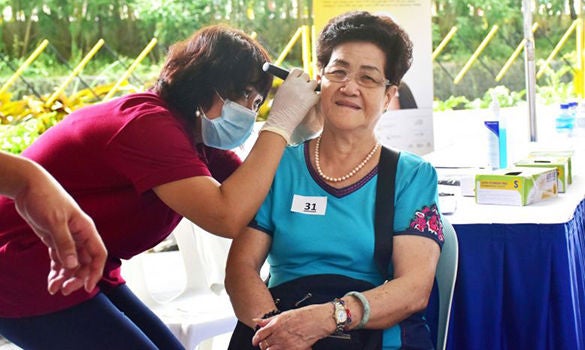
can get their ears checked at the Project Silver Screen functional screening programme. PHOTO: MINISTRY OF HEALTH
Senior citizens aged 60 and above can get their ears checked at the Project Silver Screen functional screening programme. PHOTO: MINISTRY OF HEALTH
Medical expert Dr Barrie Tan Yau Boon shares why it is vital for seniors to have good hearing throughout their golden years
As people grow older, they may start developing age-related hearing loss.
Initially, the hearing loss is very mild and not perceptible. It affects both ears and progresses gradually with age till it finally becomes noticeable to both the person as well as his family and friends.
What are the signs that a senior’s hearing ability is declining?
-
Turning up the volume of entertainment devices: When a senior increases the volume of his television or radio to a very high level, this is an early sign that he is trying to overcome his poorer hearing ability.
- Not getting the message: The senior may not seem to hear what has been said. Some seniors may ask the speaker to repeat what was just said or to speak louder. Others may lean closer to the speaker to hear better.
-
Difficulty in hearing voices of women and children: As age-related hearing loss affects the high frequencies more than the low frequencies, the senior may find listening to women’s and children’s voices more difficult as they tend to have higher-pitched voices.
-
Poor speech discrimination: Due to high-frequency hearing loss, the senior may hear something being spoken but is unable to decipher the words. He may feel that other people are mumbling or not speaking clearly.
- Difficulty in hearing in noisy environments: The senior may be able to hear when in a quiet room and facing the speaker, but not in a crowded place. He may also have difficulty using the phone.
What are the consequences if a senior’s hearing issue is not treated?
-
Communication breakdown: When a senior cannot hear what is spoken, he may not be aware of the messages conveyed by others. As a result, family members may raise their voices impatiently, which may lead to misunderstanding and tension within the family.
-
Social isolation and depression: Difficulties in hearing in crowded environments may lead to the senior avoiding social activities that could otherwise keep him engaged mentally and emotionally. The senior may also stop participating in conversations to avoid the problems of communicating entirely, which could lead to social isolation and depression.
- Physical inactivity: Hearing is not the only sense to deteriorate with age. Often, vision also becomes impaired. Having both eyesight and hearing problems may cause a senior to become socially reclusive and homebound. This also leads to a vicious cycle of doing less physical activity, which would otherwise have helped to keep him healthy.
Why should seniors get their ears checked?
Many elderly patients tell me that hearing loss is “part and parcel of growing old”. They do not realise that social communication is even more vital in the senior years to keep them active and mentally alert. Dementia has now been suggested in many studies to be aggravated by hearing loss.
Keeping our seniors actively engaged in activities and physically independent requires that all their senses are functioning well.
Seniors aged 60 years and above should go for functional screening for hearing, eyesight and oral health yearly. The hearing checks can help to detect early age-related decline in hearing loss. Follow-up treatment or hearing aids may be recommended for those with hearing issues.
With appropriate education and intervention, seniors can enjoy good hearing throughout their golden years.
Contributed by:
Dr Barrie Tan Yau Boon
Head and senior consultant, Department of Otolaryngology (Ear, Nose & Throat Surgery);
director, Centre for Hearing and Ear Implants; and
principal investigator, Hearing Research Laboratory;
Singapore General Hospital

GET SCREENED EARLY
WHAT:
- Project Silver Screen (PSS) offers functional screening for hearing, eyesight and oral health at subsidised rates to Singapore citizens aged 60 and above.
- It is a partnership between the Ministry of Health, Temasek Foundation Cares and the business community.
HOW MUCH:
- Free for Pioneer Generation card holders, $2 for Community Health Assist Scheme card holders, $5 for all other Singapore citizens.
- If you require follow-up treatment, you will be referred to the relevant healthcare services.
- Need-based subsidies are available for all treatments. You may also receive PSS vouchers of between $15 and $200 if you require aids such as spectacles, hearing aids and dentures.
WHERE AND WHEN:
- For more information and functional screening schedules, visit www.projectsilverscreen.sg or call the Singapore Silver Line on 1800-650-6060 (Monday to Friday: 8.30am to 8.30pm, and Saturday: 8.30am to 4pm, excluding public holidays).
Contributed by














 Get it on Google Play
Get it on Google Play